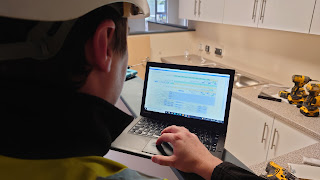How Important is Air Tightness Consultancy?
Air tightness testing is where the air loss from the fabric of a building is measured.
Most people think of air testing as a way to reduce their environmental impact and save money on their energy bills. But what you have to remember is that air tightness testing is part of the Building Regulations, so whether you’re looking to reduce energy waste or not, your building still has to comply.
One of the most frustrating aspects of air tightness testing, for me especially, is that most air tests are carried out when the build is complete. Meaning that if there were any problems, it's not only harder to fix, but also more costly. Time is precious, we’ve all heard that on repeat, especially the older we get, but no truer word has been said, especially in construction. We must, as builders, construction specialists, engineers, etc, utilise our time better. A construction designed with air tightness in mind will produce a more energy efficient build, and let’s face it, that’s what many of us are really aiming for. Not only is this better for the environment, but it will also cost less to run.
There are many companies out there who can help design your build, ensuring it's air tight. Remember these engineers have had years of experience and can ensure you essentially build better and build tighter. By employing an engineer to look over your architectural drawings, it allows them to assess the construction for air sealing across the building envelope. This will mean a full in-depth investigation of all product specifications to ensure they work alongside the target air test result.
As construction begins, the specialist engineer will continue to make visits to ensure there are no problems. They typically look at junctions, different interfaces, vapour control layers, and the applications of all materials, to ensure that it is being built exactly to the requirements. Any problems, concerns, or even deviations from the plans, will be picked up early, meaning any remedial work will be completed quickly!
It’s especially important if you’re hoping to produce an extremely air tight build that you undertake at least 2 air tests, one as standard, on completion. The other will be done first when the shell of the building is complete. But I would suggest and strongly recommend you get assistance throughout the whole process!
Don’t forget, when talking about air tightness, you must also consider ventilation. An air tight build must have the right ventilation systems installed. This is yet another reason why you should employ the help of an engineer at the earliest possible stage. Air tightness will have a huge impact on other elements of the construction and you need all elements to work together!




